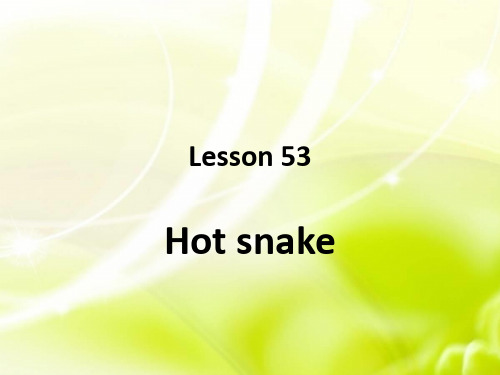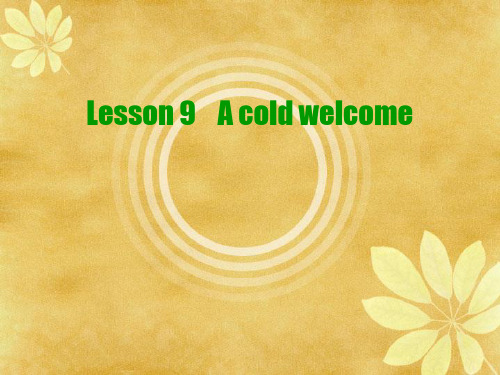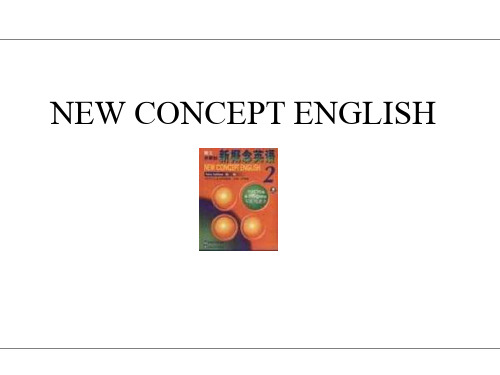新概念英语第二册 ppt课件
合集下载
新概念英语第二册课件Lesson16(共14张PPT)

• ★fail v. 无视,忘记 fail v.失败 fail+宾语:失败做某事 fail in doing sth:在某些方面失败 He failed./He failed in examination. fail to do:没有能够在某事 He failed to swim across the river. not fail to do sth.一定能够某事 I can not fail to pass it. You can not fail to drive it.你一定能够驾驶 If you receive a request like this, You can not fail to obey it. If you arrived in Beijing ,you cannot fail to find the New Oriental School.
New words and expressions
★note n. 便条 m• essage:消息 note:纸条,纸钞 make notes:做笔记 ★area n. 地段 area:场地,地段(一块对方) place:地点 region:地区(交战,开火)
In this region, there were a lot of wars. ★sign n. 指示牌 ★reminder n. 提示 remind v.:提示,提醒
Comprehension questions
• 6.Where were you spending a holiday? • In Sweden. • 7.What did you find on your car? • A note. • 8.Did it welcome you ti the city? • Yes, it did. • 9.Were you in a ‘No parking’ area? • Yes, I was. • 10.What did the note ask you to pay attention to? • To the street signs.
New words and expressions
★note n. 便条 m• essage:消息 note:纸条,纸钞 make notes:做笔记 ★area n. 地段 area:场地,地段(一块对方) place:地点 region:地区(交战,开火)
In this region, there were a lot of wars. ★sign n. 指示牌 ★reminder n. 提示 remind v.:提示,提醒
Comprehension questions
• 6.Where were you spending a holiday? • In Sweden. • 7.What did you find on your car? • A note. • 8.Did it welcome you ti the city? • Yes, it did. • 9.Were you in a ‘No parking’ area? • Yes, I was. • 10.What did the note ask you to pay attention to? • To the street signs.
新概念英语第二册lesson40课件共25张PPT

3. If I ______ you, I ______ more attention to English idioms
and phrases.
A. was; shall pay
B. am; will pay
C. would be; would pay D. were; would pay
4. —Alice, why didn’t you come yesterday? —I ______, but I had an unexpected visitor. A. had B. would C. was going to D. did
① v. 使……固定、安装 fix the picture on the wall She fixed a handle on the door. ② v. 修理 fix on使(目光、注意力等)集中于,盯着 fix one's eyes on sth./ one's eyes be fixed on sth.盯着……目不转睛 All the eyes were fixed on the blackboard.
2).If he had taken my advice,he would not have made such a mistake. 如果他听我的劝告的话,就不会犯这样的错误了。(事实:没有听我的话)
Exercises:
1. I don’t think that I shall fail. But if I ______, I would try again. A. should fail B. would fail
2.Mrs. Rumbold was a large, unsmiling lady in a tight black dress. unsmiling adj. 不笑的 unsmiling的反义词为 smiling 有些形容词前面可以加上前缀un-来表示相反的意义:
新概念英语第二册课件Lesson 8 (共15张PPT)

• Enter 进入- go into • Enter for报名参赛—register 注册参赛 • Enter the university after enter for the test
taken/in my life/of them.
不规则变化 好坏多少远
• Good better the best
• Bad worse the worst
• Many much – more – the most
• Little- less-the least
• Far – farther – the farthest
wooden
• Wood 木头
adj. 木头的
• Wooden木头的 • Wool 羊毛 • Woolen 羊毛的
pool n. 水池
• Pool • Poor • Oo-通常是长音特例如下 • Book good look cook wood foot, stood • 书好看, 煮木头脚 • Do a football pool 买彩票
neat adj. 整齐的,整洁的
• Neat • Neatly副词
• A neat road • Tidy 整洁 clean干净的
path n. 小路,小径
• Pa th • Road – street – path • Lane 辅道 可以停车 • Avenue 大道 • --way 路 • 路线---route –路途-游览线路
Lesson 8 The best and the worst
【New words and expressions】 (5)
• competition n. 比赛,竞赛 • neat adj. 整齐的,整洁的 • path n. 小路,小径 • wooden adj. 木头的 • pool n. 水池
taken/in my life/of them.
不规则变化 好坏多少远
• Good better the best
• Bad worse the worst
• Many much – more – the most
• Little- less-the least
• Far – farther – the farthest
wooden
• Wood 木头
adj. 木头的
• Wooden木头的 • Wool 羊毛 • Woolen 羊毛的
pool n. 水池
• Pool • Poor • Oo-通常是长音特例如下 • Book good look cook wood foot, stood • 书好看, 煮木头脚 • Do a football pool 买彩票
neat adj. 整齐的,整洁的
• Neat • Neatly副词
• A neat road • Tidy 整洁 clean干净的
path n. 小路,小径
• Pa th • Road – street – path • Lane 辅道 可以停车 • Avenue 大道 • --way 路 • 路线---route –路途-游览线路
Lesson 8 The best and the worst
【New words and expressions】 (5)
• competition n. 比赛,竞赛 • neat adj. 整齐的,整洁的 • path n. 小路,小径 • wooden adj. 木头的 • pool n. 水池
新概念英语第二册Lesson 52 A pretty carpet 课件(共19张PPT)

not only since 因为(连词)
2024/9/11
but
as well
because 1.表示直接原因
since
2.它所指的原因通常是听话人所不知道的,即说话人认为听话人不知道 3.通常被放置于主句之后 4. 常用来回答why的提问 1.显然的或已为人所知的理由,常译为 “既然”
2.语气比because稍弱,通常置于句首,表示一种含有勉强语气的原因。
2024/9/11
现在完成时和现在完成进行时的区分 1.现在完成时表示动作已经结束,而完成进行时并不一定如此 2. 完成时强调动作的结果,完成进行时强调动作持续的时间
2024/9/11
have explained earned
understand
Are has been working
listenning
as 含义与since相同,但语气更弱,没有since正式,常译为“由于,鉴于”
2024/9/11
2024/9/11
现在完成时 have/has + done 1.动作发生在过去对现在还有影响 2.动作发生在过去一直持续到现在 现在完成进行时 have/has + been + doing 1.动作发生在过去,一直延续到现在,还可能继续延续下去 2.表示重复性动作 3.表示感情色彩
2024/9/11
2024/9/11
has
earned
didn’t listen
2024/9/11
形容词和副词 1.形容词变为副词后意思可能有所改变。 2.有一些形容词变为副词时不需要改变形式 (既可以作形容词,也可以作副词)
2024/9/11
3.有一些形容词ly以后,变成一个新的副词,意思和原词无关
新概念英语第二册课件Lesson21共25页PPT

summary 概要,摘要
☆sum n.量
大量:a great many/a great number of+可数名词 复数
a sum of:一笔
a large sum of:大量的,喜欢跟钱连用
a large sum of money
a large amount of:许多
plenty of(注意:前面没有a)足够的
及物动词 vt.
1.计算...的总和[(+up)] 2.总结;概括;概述[(+up)] The story may be summed up in one sentence. 该故事可以用一句话来概括。
不及物动词 vi.
1.共计[(+to/into)]
reason [’ri:zən] n.原因
for this reason:由于这个原因
1.疯的 The woman lost her son and got mad. 那个女人丢了孩子后疯了。 2.愚蠢的,不明智的(用于口语) You must be mad to drive so fast! 你开这么快,简直是疯了! 3.非常生气的(口语)~at/with He is mad with the dog for biting his new shoe. 够咬了他的新鞋,他气得火冒三丈。 4.非常喜欢 So many people are mad on football. 很多人痴迷足球。
不及物动词 vi.
1.相撞,碰击[(+against)] His legs knocked against the chair. 他的两条腿撞到了椅子。 2.敲,击,打[(+on/at)] He knocked at the door and entered. 他敲了敲门便走进去了。 3.(发动机等由于故障)发爆震声
☆sum n.量
大量:a great many/a great number of+可数名词 复数
a sum of:一笔
a large sum of:大量的,喜欢跟钱连用
a large sum of money
a large amount of:许多
plenty of(注意:前面没有a)足够的
及物动词 vt.
1.计算...的总和[(+up)] 2.总结;概括;概述[(+up)] The story may be summed up in one sentence. 该故事可以用一句话来概括。
不及物动词 vi.
1.共计[(+to/into)]
reason [’ri:zən] n.原因
for this reason:由于这个原因
1.疯的 The woman lost her son and got mad. 那个女人丢了孩子后疯了。 2.愚蠢的,不明智的(用于口语) You must be mad to drive so fast! 你开这么快,简直是疯了! 3.非常生气的(口语)~at/with He is mad with the dog for biting his new shoe. 够咬了他的新鞋,他气得火冒三丈。 4.非常喜欢 So many people are mad on football. 很多人痴迷足球。
不及物动词 vi.
1.相撞,碰击[(+against)] His legs knocked against the chair. 他的两条腿撞到了椅子。 2.敲,击,打[(+on/at)] He knocked at the door and entered. 他敲了敲门便走进去了。 3.(发动机等由于故障)发爆震声
新概念英语第二册课件Lesson56(共25张PPT)

bomb
n. 炸弹; vt. 投弹于, 轰炸 炸弹爆炸了。 The bomb exploded.
★ course ① n. 跑道,行程 on the course 按照轨道运行 off course 偏离轨道 of course 当然 那只船沿著航线航行 The ship is on course. 那架飞机偏离航线很多英里 The plane was many miles off course.
Slow down. You're speeding. ② n. 速度
at the speed of 以 …… 的速度
此车以车速40公里/小时的速度行驶。
The car goes at the speed of 40 miles an hour.
speed up
速度的增加, 加速
slow down
减速
at the end of … 在…… 的末尾/最后部分 他在会议要结束的时候,讲了几句话。 He spoke a few words at the end of the meeting.
have trouble (in) doing sth. 干……有麻烦,做 ……很困难
他们在找出火灾的原因的时候遇到了困难。 They had some trouble finding out the cause of
cute adj. 漂亮, 常用来形容小孩 The baby is cute. 多漂亮的宝宝啊! What a cute baby! 你多可爱啊! How cute you are!
★explosion n. 爆炸, 轰响 在第二次爆炸之后,伦敦的主要火车和地铁站都关闭了。
After the second explosion, all of London' s main train and subway stations were shut down
n. 炸弹; vt. 投弹于, 轰炸 炸弹爆炸了。 The bomb exploded.
★ course ① n. 跑道,行程 on the course 按照轨道运行 off course 偏离轨道 of course 当然 那只船沿著航线航行 The ship is on course. 那架飞机偏离航线很多英里 The plane was many miles off course.
Slow down. You're speeding. ② n. 速度
at the speed of 以 …… 的速度
此车以车速40公里/小时的速度行驶。
The car goes at the speed of 40 miles an hour.
speed up
速度的增加, 加速
slow down
减速
at the end of … 在…… 的末尾/最后部分 他在会议要结束的时候,讲了几句话。 He spoke a few words at the end of the meeting.
have trouble (in) doing sth. 干……有麻烦,做 ……很困难
他们在找出火灾的原因的时候遇到了困难。 They had some trouble finding out the cause of
cute adj. 漂亮, 常用来形容小孩 The baby is cute. 多漂亮的宝宝啊! What a cute baby! 你多可爱啊! How cute you are!
★explosion n. 爆炸, 轰响 在第二次爆炸之后,伦敦的主要火车和地铁站都关闭了。
After the second explosion, all of London' s main train and subway stations were shut down
新概念英语第二册课件Lesson53(共50张PPT)

★cause
be caused by…
• 1)V. 引起
某事由…引起
• cause sth : 引起(麻烦)
• 粗心导致事故 • Carelessness causes accidents.
carelessness
• 骄傲使人失败
• Pride causes failure
• cause sb to do sth
5. They were also quite sure that a cigarette end did not start the fire. 他们还十分肯定火灾也不是由烟头引起的。
be sure 确定 Be sure to sweep the room clean. 一定要把房间打扫干净。 I am sure you would get along very well with him. 我相信你一定会跟他相处得很好。 One thing is sure; he can't have gone far. 有一点是肯定的,他不可能走得很远。 She is sure to pass the examination. 她一定会通过考试。
• Pepper and mustard are hot. • 3)强烈的,激烈的,热烈的. • have a hot temper 脾气暴躁
• a hot potato • 棘手或讨厌的事物或情况
★fireman=firefighter • n 消防队员 • hydrant [`haidrənt] • n.消防栓 • fire extinguisher • 灭火器 • Extinguish [ik`stiŋgwiʃ] • =put out • 灭火
3. Forest fires are often caused by broken glass or by cigarette ends which people carelessly throw away. 森林火灾时常由破碎的玻璃或人们随手扔掉的香烟头引起。
新概念英语第二册课件Lesson 9 (共21张PPT)

• 2. (眉等)皱起
• 3. 生脓,化脓 名词 n. 1. 聚集
• 2. 收获量
gather指人们聚 集在一起,尤指 自发性的聚集
• 3. 衣褶
• refuse
美音:[rɪ'fjuz]
• refuse 1 及物动词 vt. 1. 拒绝;拒受;拒给;不准[O1] He refused my offer of help. 他拒绝了我的帮助。
1st •表示具体时间 on Wednesday
evenday
•用at的时间短语:
•表示确切时间 at five to twelve •表示用餐时间 at lunchtime •表示具体时间 at night
• during 在···期间 • during the hoilday 强调假期从头到尾 • from ···till ··· 指一段明确的时间 • until 直到 • until的主句和从句两个都用一般过去时(
refuse sb\sth refuse to do
•welcome 美音:['wɛlkəm]
• welcome sb to+地点 • a warm welcome 热烈的欢迎 • You are welcome to+地点
• strike
美音:[straɪk]
• v:打,击,弹,敲···(钟,乐器···)
• 5. 猜想,推测+(that) I gather that he is the one in charge. 我猜想他是负责的人。
• 6. 使皱起
She gathered her brows into a frown. 她皱起了眉。
• 不及物动词 vi. 1. 积聚;集合
新概念英语第二册PPT课件

• most +n. = most of the +n. 大多数的…… • most young people / most of the young people • will be waiting 将来进行时 • I will be right here waiting for you. • on the coast 在海边
某种技能) • teach sb. to do sth. 教某人做……(只是教, 会不会不管) • trainer n. 教练; trainee n. 受训的人 • training center 训练中心 • ★anxiously adv. 焦急 • anxious adj. 焦急的 • ★intend v. 打算 • intend to do sth.=be going to do sth. 打算做某事 • ★solid adj. 固体的, 硬的;n. 固体 • ① adj. 固体的
• between them 左右各一个人
• 限定性定语从句/非限定性定语从句(复习定语从句)
• 如果是有逗号的是非限定性定语从句, 没有逗号的是 限定性定语从句, 非限定性定语从句不可以用that, 限定性定语从句少了后面的句子, 这句话意思不完整, 非限定性定语从句前面的句子完整, 后面的句子起着 补充说明的作用,非限定性定语从句一旦有逗号隔开, 后面的句子和前面的句子关系不紧密, 起补充作用。
• 【Language points】
• 1、Across the Channel
• across 横渡
• the Channel=the English Channel 英吉利 海峡(当“C”大写时, 一定是指the English Channel)
• 2、She is going to set out from the French coast at five o'clock in the morning.
某种技能) • teach sb. to do sth. 教某人做……(只是教, 会不会不管) • trainer n. 教练; trainee n. 受训的人 • training center 训练中心 • ★anxiously adv. 焦急 • anxious adj. 焦急的 • ★intend v. 打算 • intend to do sth.=be going to do sth. 打算做某事 • ★solid adj. 固体的, 硬的;n. 固体 • ① adj. 固体的
• between them 左右各一个人
• 限定性定语从句/非限定性定语从句(复习定语从句)
• 如果是有逗号的是非限定性定语从句, 没有逗号的是 限定性定语从句, 非限定性定语从句不可以用that, 限定性定语从句少了后面的句子, 这句话意思不完整, 非限定性定语从句前面的句子完整, 后面的句子起着 补充说明的作用,非限定性定语从句一旦有逗号隔开, 后面的句子和前面的句子关系不紧密, 起补充作用。
• 【Language points】
• 1、Across the Channel
• across 横渡
• the Channel=the English Channel 英吉利 海峡(当“C”大写时, 一定是指the English Channel)
• 2、She is going to set out from the French coast at five o'clock in the morning.
新概念英语第二册课件Lesson19共58页PPT

I said.
• “也许已经开演了呢,”苏珊回答 说。
• 'It may have begun already,' Susan answered.
肯定 可能 可能 也许 也许
推测 must can could may might
真实性 95% 60% 40% 30% 20%
否定 can’t
can’t
can , could 表示能够
• 1. 表示会做 2. 或很可能做某事。
• 我会弹钢琴。 • I can play piano. • 我明天能来。 • I can • I couldn’t sleep last night.
Could (not) have done
A. wouldn’t B. can’t C. mustn’t D. needn’t
• Some people who don’t like to talk much are not necessarily shy;they ____ just be quiet people.
• A. must B. may C. should
• D. would
—Hi, Tom. Any idea where Jane is? —She_____ in the classroom. I saw her there just now. A. shall be B. should have been C. must be D. might have been
• “真可惜!”苏珊大声说。 • “What a pity!” Sue exclaimed.
Pity n.
• What a pity! • What a shame!
长大成人是多么遗憾的事啊。
• “也许已经开演了呢,”苏珊回答 说。
• 'It may have begun already,' Susan answered.
肯定 可能 可能 也许 也许
推测 must can could may might
真实性 95% 60% 40% 30% 20%
否定 can’t
can’t
can , could 表示能够
• 1. 表示会做 2. 或很可能做某事。
• 我会弹钢琴。 • I can play piano. • 我明天能来。 • I can • I couldn’t sleep last night.
Could (not) have done
A. wouldn’t B. can’t C. mustn’t D. needn’t
• Some people who don’t like to talk much are not necessarily shy;they ____ just be quiet people.
• A. must B. may C. should
• D. would
—Hi, Tom. Any idea where Jane is? —She_____ in the classroom. I saw her there just now. A. shall be B. should have been C. must be D. might have been
• “真可惜!”苏珊大声说。 • “What a pity!” Sue exclaimed.
Pity n.
• What a pity! • What a shame!
长大成人是多么遗憾的事啊。
新概念英语第二册课件Lesson 25(PPT)

2 . Did he understand you at last or not? Could you understand his answer? ( but)
3 . Did your teacher ever speak English like that or not? 4 . What did the porter say to you?
English亦可作形容词,表示“英格兰的”“英国 的”“英国人的”等
He was English.
I arrived in London at last. He arrived at the airport an hour ago.
At last表示“终于”,一般暗指经过一番等、麻 烦或努力以后终于得到或做到。
6. 不知道为什么博物馆今天关门了。 I wonder why the museum is closed today.
7. 我在想你会不会帮我。 I’m wondering if you could help me.
8. 这是个巨大的奇迹。 It’s a great wonder.
Key words
Do the English speak English? English在这里均为名词,但意义不同。第一个 指____,为总称,后面的动词必须用复数; 第二个指____ 。指语言时前不加冠词,指人 时则要加the:
The English often talk about _____.
Do you speak English?
3. 当either …or和neither … nor连接主语时,谓语 动词与后一个主语保持一致。
Neither Liz nor I teach mathematics.
3 . Did your teacher ever speak English like that or not? 4 . What did the porter say to you?
English亦可作形容词,表示“英格兰的”“英国 的”“英国人的”等
He was English.
I arrived in London at last. He arrived at the airport an hour ago.
At last表示“终于”,一般暗指经过一番等、麻 烦或努力以后终于得到或做到。
6. 不知道为什么博物馆今天关门了。 I wonder why the museum is closed today.
7. 我在想你会不会帮我。 I’m wondering if you could help me.
8. 这是个巨大的奇迹。 It’s a great wonder.
Key words
Do the English speak English? English在这里均为名词,但意义不同。第一个 指____,为总称,后面的动词必须用复数; 第二个指____ 。指语言时前不加冠词,指人 时则要加the:
The English often talk about _____.
Do you speak English?
3. 当either …or和neither … nor连接主语时,谓语 动词与后一个主语保持一致。
Neither Liz nor I teach mathematics.
新概念第二册英语时态课件 (共29张PPT)

时间状语从句(when, until after, before until, etc)
条件状语从句(if,unless, etc)
让步状语从句(though, although, etc)
1.一般现在时
3.表示永恒的真理,即使出现在过去的语境中,仍然用一般现 在时。
4. 在make sure (certain)=see to it, mind, care, matter + 宾
come true, consist of ,take place, happen, occur, break out, appear, arrive, die, fall, last, exist, fail, succeed, become, rise, 二、下列动词主动表被动,常与well, quite, easily, badly等连用
6、S+ was /were + being + pp….(过去进行时)
7、S+ has /have +been+ pp…. (现在完成时)
8、S+ had been + pp….
(过去完成时)
9、S+情态动词+ be+ pp….
(情态动词)
语态考点
一、不能用于被动语态的情况 所有不及物动词或不及物动词词组不用被动式:
❖ 表示状态存在的动词:be, exist, remain, stay, 等。 ❖ 表示占有或存属关系动词:have, own, belong, contain等。 ❖ 表示思考、理解等心理活动的动词:believe, doubt,
forget, know, remember, understand等。
条件状语从句(if,unless, etc)
让步状语从句(though, although, etc)
1.一般现在时
3.表示永恒的真理,即使出现在过去的语境中,仍然用一般现 在时。
4. 在make sure (certain)=see to it, mind, care, matter + 宾
come true, consist of ,take place, happen, occur, break out, appear, arrive, die, fall, last, exist, fail, succeed, become, rise, 二、下列动词主动表被动,常与well, quite, easily, badly等连用
6、S+ was /were + being + pp….(过去进行时)
7、S+ has /have +been+ pp…. (现在完成时)
8、S+ had been + pp….
(过去完成时)
9、S+情态动词+ be+ pp….
(情态动词)
语态考点
一、不能用于被动语态的情况 所有不及物动词或不及物动词词组不用被动式:
❖ 表示状态存在的动词:be, exist, remain, stay, 等。 ❖ 表示占有或存属关系动词:have, own, belong, contain等。 ❖ 表示思考、理解等心理活动的动词:believe, doubt,
forget, know, remember, understand等。
- 1、下载文档前请自行甄别文档内容的完整性,平台不提供额外的编辑、内容补充、找答案等附加服务。
- 2、"仅部分预览"的文档,不可在线预览部分如存在完整性等问题,可反馈申请退款(可完整预览的文档不适用该条件!)。
- 3、如文档侵犯您的权益,请联系客服反馈,我们会尽快为您处理(人工客服工作时间:9:00-18:30)。
如果陌生人想进你的房子,你可以说: It's my private house.
词汇拓展: public
a.公众的;公共的;公开的 n.公众,民众
公立学校是public school
the public 公众; public letter 公开信; public place 公共场所
They made the secret public. 他们公开了这个秘密。
2. 注意发音!
Seat vs Sit
take a seat/take your seat 坐 下来,就坐
口语实战
请坐的3种说法: Sit down, please.(命令性) take your seat, please. Be seated, please.(更礼貌)
下面这个句子在口语、电影里很常见: Is the seat taken?
dialogue
对白,对话
Most plays are written in dialogue.
大多数戏剧都是用对话体写的.
chat vi./ n.闲谈,聊天
就是北京人说的“侃大山ossip 嚼舌头,说长道短
gossip
n.流言蜚语;爱说长道短的人 vi.传播流言
报纸的报道往往不尊重私人权利.
private还有一个值得注意的意思: 普通的
如:private citizen 普通公民; private soldier 大兵
拯救大兵瑞恩
☆conversation n.谈话
subject of conversation 话题 (天气是英国人最喜爱的话题)
angry adj. 生气的 angrily adv. 生气地 attention n. 注意 bear v. 容忍 business n. 事 rudely adv. 无礼地,粗鲁地
重点词汇详解与扩展
联想记忆,词汇倍增
☆private adj.私人的
如果妈妈想看你的信,你可以说: It's my private letter.
Talk with/to sb about sth
I had a long talk with the headmaster about my son. 关於我儿子的问题我与校长谈
了很长时间.
而作复数时则常指政治家之间在庄 重的场合中进行的严肃谈话:
to hold peace talks 举行和谈
When all those present___he began his lecture. A.sit B.set C.seated D.were seated
A改为sat就对了
☆seat n.座位
这个词很重要,考试常考。
1. have a good seat,这里的seat 指place,而不是chair。
去看戏
注意拼写规则: theatre (Br)= theater (US) centre = center metre = meter
☆go to the+地点:表示去某地 干特定某事
以下几种表达都是“看电影”的意思 go to the cinema Go to the film Go to the movies
She loves to gossip to her neighbors.
她喜欢议论邻居们的是非长短。 gossip to sb. 讨论某人的是非
She's a terrible gossip. 她专爱说人闲话。
课文语言点详解
Last week, I went to the theatre.
Movie theater (US) 电影院
go to the +人+‘s:表示去这个人开的 店
go to the doctor‘s 去诊所看病 go to the butcher’s 去肉店买肉 go to the grocer’s 去杂货店买东西
零冠词
go to +地点:去某地做相关的事
a danger to public health
对公众健康的威胁
Smoking is not allowed in public places.
禁止在公众场合吸烟。
privacy n. 隐私
Newspapers often don't respect the individual's right to privacy.
新概念英语第二册
课程特色
本课程强调五项综合技能训练
listening: 听力 speaking: 说话 reading : 阅读 writing :写作 translation :译
grammar 语法
本课程将结合中考系统讲授初 中语法知识
进行大量的词汇扩展,使你的词 汇量倍增 在课堂上进行大量口语练习,系 统纠正发音,训练英语思维
go to school 去上学; go to church 去做礼拜; go to hospital 去看病 go home 回家休息
[注]跟home相连一定表示没有事情可做,休闲
I had a very good seat.
考点:作为动词的seat与sit的区别 sit--vi; seat--vt seat sb 让某人就坐
请区分以下几种谈话:
conversation 通常指亲切的交谈, 常 以交流思想或情况为目的:
Television has killed the art of conversation. 电视扼杀了交谈的艺术.
Talk
1. 可作可数名词, 通常指在普通场合 对少数人发表的简短讲话
talk with / to sb. = have a talk with sb
大量的文化背景知识介绍
要求学生背诵每课课文
Lesson 1
A private conversation 私人谈话
生词和短语 words and expressions
private adj. 私人的 conversation n. 谈话 theatre n. 剧场,戏院 seat n. 座位 play n. 戏 loudly adv. 大声地
词汇拓展: public
a.公众的;公共的;公开的 n.公众,民众
公立学校是public school
the public 公众; public letter 公开信; public place 公共场所
They made the secret public. 他们公开了这个秘密。
2. 注意发音!
Seat vs Sit
take a seat/take your seat 坐 下来,就坐
口语实战
请坐的3种说法: Sit down, please.(命令性) take your seat, please. Be seated, please.(更礼貌)
下面这个句子在口语、电影里很常见: Is the seat taken?
dialogue
对白,对话
Most plays are written in dialogue.
大多数戏剧都是用对话体写的.
chat vi./ n.闲谈,聊天
就是北京人说的“侃大山ossip 嚼舌头,说长道短
gossip
n.流言蜚语;爱说长道短的人 vi.传播流言
报纸的报道往往不尊重私人权利.
private还有一个值得注意的意思: 普通的
如:private citizen 普通公民; private soldier 大兵
拯救大兵瑞恩
☆conversation n.谈话
subject of conversation 话题 (天气是英国人最喜爱的话题)
angry adj. 生气的 angrily adv. 生气地 attention n. 注意 bear v. 容忍 business n. 事 rudely adv. 无礼地,粗鲁地
重点词汇详解与扩展
联想记忆,词汇倍增
☆private adj.私人的
如果妈妈想看你的信,你可以说: It's my private letter.
Talk with/to sb about sth
I had a long talk with the headmaster about my son. 关於我儿子的问题我与校长谈
了很长时间.
而作复数时则常指政治家之间在庄 重的场合中进行的严肃谈话:
to hold peace talks 举行和谈
When all those present___he began his lecture. A.sit B.set C.seated D.were seated
A改为sat就对了
☆seat n.座位
这个词很重要,考试常考。
1. have a good seat,这里的seat 指place,而不是chair。
去看戏
注意拼写规则: theatre (Br)= theater (US) centre = center metre = meter
☆go to the+地点:表示去某地 干特定某事
以下几种表达都是“看电影”的意思 go to the cinema Go to the film Go to the movies
She loves to gossip to her neighbors.
她喜欢议论邻居们的是非长短。 gossip to sb. 讨论某人的是非
She's a terrible gossip. 她专爱说人闲话。
课文语言点详解
Last week, I went to the theatre.
Movie theater (US) 电影院
go to the +人+‘s:表示去这个人开的 店
go to the doctor‘s 去诊所看病 go to the butcher’s 去肉店买肉 go to the grocer’s 去杂货店买东西
零冠词
go to +地点:去某地做相关的事
a danger to public health
对公众健康的威胁
Smoking is not allowed in public places.
禁止在公众场合吸烟。
privacy n. 隐私
Newspapers often don't respect the individual's right to privacy.
新概念英语第二册
课程特色
本课程强调五项综合技能训练
listening: 听力 speaking: 说话 reading : 阅读 writing :写作 translation :译
grammar 语法
本课程将结合中考系统讲授初 中语法知识
进行大量的词汇扩展,使你的词 汇量倍增 在课堂上进行大量口语练习,系 统纠正发音,训练英语思维
go to school 去上学; go to church 去做礼拜; go to hospital 去看病 go home 回家休息
[注]跟home相连一定表示没有事情可做,休闲
I had a very good seat.
考点:作为动词的seat与sit的区别 sit--vi; seat--vt seat sb 让某人就坐
请区分以下几种谈话:
conversation 通常指亲切的交谈, 常 以交流思想或情况为目的:
Television has killed the art of conversation. 电视扼杀了交谈的艺术.
Talk
1. 可作可数名词, 通常指在普通场合 对少数人发表的简短讲话
talk with / to sb. = have a talk with sb
大量的文化背景知识介绍
要求学生背诵每课课文
Lesson 1
A private conversation 私人谈话
生词和短语 words and expressions
private adj. 私人的 conversation n. 谈话 theatre n. 剧场,戏院 seat n. 座位 play n. 戏 loudly adv. 大声地
